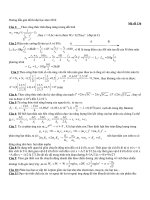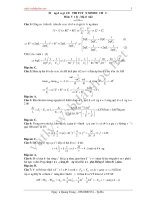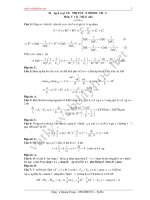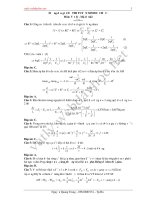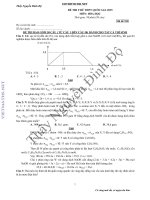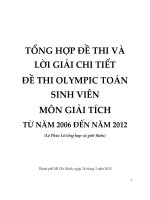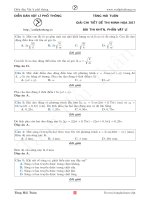Giải chi tiết đề thi vào lớp 10 môn tiếng anh hà nội năm 2020
Bạn đang xem bản rút gọn của tài liệu. Xem và tải ngay bản đầy đủ của tài liệu tại đây (99.72 KB, 20 trang )
Hướng dẫn giải đề thi vào lớp 10 môn Tiếng Anh tại Hà Nội năm 2020
Mark the letter A, B, C or D on your answer sheet to indicate the word whose underlined part differs from the
other three in pronunciation in each of the following questions.
Question 1.
A. better
B. father
C. bigger
D. reuse
B. visited
C. stopped
D. watched
Question 2.
A. looked
Mark the letter A, B, C or D on your answer sheet to indicate the word that differs from the other three in the
position of primary stress in each of the following questions.
Question 3.
A. improve
C. pollute
B. culture
D. attend
Question 4.
A. decide
B. reduce
C. invite
D. famous
Mark the letter A, B, C or D on your answer sheet to indicate the correct answer to each of the following
questions.
Question 5. _______ his aunt really likes the apartment, she can't afford to buy it.
A. Although
C. If
B. Because
D. So
Question 6. The doctor advised my uncle to stop _______ because it's quite harmful to his health.
A. to smoking
C. to smoke
B. smoking
D. smoke
Question 7. More and more young people are moving to the city as there are _______ of job opportunities here.
A much
B. a lot
C. a little
D. many
Question 8. The artwork was _______ done by the artisan.
A. careless
B. careful
C. carefully
D. care
Question 9. The light went out while he _______ dinner with his family,
A. is having
C. had
B. have had
D. was having
Question 10. Last Sunday we arrived at the waterfall nearby _______ 7:00 a.m.
A. of
B. at
C. in
D. on
Question 11. The students enjoy _______ badminton every morning.
A. played
C. plays
B. playing
D. to play
Question 12. They decided to learn French _______ study in Paris.
A. so that
B. so as to
C. in order that D. in order
Question 13. Your brother passed the final exam, _______?
A. did he
B. doesn't he
C. does he
D. didn't he
Question 14. I got some _______ advice on how to make a presentation from my teacher, so I passed my oral
test.
A. useless B. uselessness
C. useful
D. usefulness
Mark the letter A, B, C or D on your answer sheet to indicate the word(s) CLOSEST in meaning to the
underlined word(s) in each of the following questions.
Question 15. My brother went on with the project even though his boss said it was impossible to do it.
A. fought
C. made
B. began
D. continued
Question 16. We should go to the mountainous area to enjoy some fresh air at the weekend.
A. unpolluted
C. windy
B. rainy
D. polluted
Mark the letter A, B, C or D on your answer sheet to indicate the word(s) OPPOSITE in meaning to the
underlined word(s) in each of the following questions.
Question 17. I find playing sports an exciting way to exercise.
A. normal
B. interesting
C. regular
D. boring
Question 18. Tom felt nervous the moment the plane took off.
A. turned off
C. ran
B. flew up
D. landed
Mark the letter A, B, C or D on your answer sheet to indicate the most suitable response to complete each of
the following exchanges.
Question 19. Robert: "Would you like to have dinner with me tonight?"
Mary: "__________________”
A. No, I won't
B. Yes, I will
C. Never mind, thanks
D. Yes, I'd' love to
Question 20. Jim: "What a beautiful painting"
Nam: "__________________”
A. I don't mind if you say that
B. It's very nice of you to say so
C. I'm glad to tell you so
D. You're welcome
Read the following passage and mark the letter A, B, C, or D on your answer sheet to indicate the correct
answer to each of the questions.
Ha Long Bay is a UNESCO World Heritage site in Quang Ninh province, in the northeast of VietNam. It has got
over 1, 600 islands and islets. Among the many ancient fishing villages in Ha Long Bay, only Cua Van floating
village remains. All the houses and buildings in the village float on huge wooden rafts.
The villagers spend their days fishing and looking after the sea life. Then they sail to the mainland to trade their
fish for things like food, drinking water or clothes. Most children go to floating schools and then spend the rest of
their time learning important skills like swimming and fishing. They also help out their parents as much as they
can.
Their lifestyle may seem strange to many people, but it's so wonderful to live among such natural beauty and
know you are protecting it. The villagers are able to help preserve their beautiful bay because they live directly on
the water.
Question 21. The word "they" in paragraph 2 is closest in meaning to _______.
A. the houses
C. the schools
B. the builders
D. the villagers
Question 22. According to the passage, the villagers' lifestyle may seem _______ to many people.
A. strange
B. boring
C. tiring
D. dangerous
Question 23. The villagers not only fish but also _______ the sea life.
A. look at
B. look after
C. damage
D. pollute
Question 24. The villagers are able to help preserve their beautiful bay because _______.
A. they live directly on the water
B. they don't live directly on the water
C. they live far from the sea
D. they live on the land
Read the following passage and mark the letter A, B, C, or D on your answer sheet to indicate the correct
answer to each of the questions.
Over the last five years, more and more students from the school have taken part in environmental projects, such
as tree planting and improving the school grounds. But, no matter how much we do, there's always more that can
be (25) _______ to improve the place where we live.
This year students from the Conservation Club plan to work with local people to make a community garden near
the school. As Tim, a student, says: "No one (26) _______ to live in an unattractive area. If we work together, we
can turn these areas into spaces that we can enjoy (27) _______ time in." This kind of local action is not just about
(28) _______ environment. It also helps people get to know (29) _______ neighbors and it can help build stronger
communities.
If you care (30) _______ the state of your town, and you are interested in taking part in the project, please contact
the school for further information.
Question 25. A. do
B. did
Question 26. A. want
B. wants
Question 27. A. paying
Question 28. A. a
C. done
Question 29. A. their
C. stays
B. doing
B. an
B. his
Question 30. A. about
B. on
D. does
D. stay
C. giving
C. the
C. her
C. at
D. spending
D. /
D. its
D. in
Mark the letter A, B, C or D on your answer sheet to indicate the underlined part that needs correction in each
of the following questions.
Question 31. The doctor which we met in France has just sent us a greeting card.
A. a
B. which
C. has
D. met
Question 32. We canceled our camping trip because of it rained heavily.
A. heavily
B. canceled
C. because of
D. camping
Question 33. You should to read more books if you want to improve your English vocabulary.
A. to improve
C. vocabulary
B. to read
D. if
Question 34. I wish all the children in the world don't have to live in poverty any more.
A. in
B. all the children
C. don't have to
D. the
Mark the letter A, B, C, or D on your answer sheet to indicate the sentence that is closest in meaning to the
original sentence in each of the following questions.
Question 35. “Let's go to Ngoc Son temple on New Year's Eve, " Mai said.
A. Mai suggested go Ngoc Son temple on New Year's Eve.
B. Mai suggests going to Ngoc Son temple on New Year's Eve.
C. Mai suggested that we went to Ngoc Son temple on New Year's Eve.
D. Mai suggested going to Ngoc Son temple on New Year's Eve.
Question 36. Ally wants to buy that dress, but she doesn't have enough money.
A. If Ally has enough money, she can buy that dress.
B. If Ally have enough money, she could buy that dress.
C. If Ally had enough money, she will buy that dress.
D. If Ally had enough money, she could buy that dress.
Question 37. Your house is more modern than mine.
A. My house is more modern than yours.
B. My house isn't as modern as yours house.
C. My house isn't as modern as yours.
D. My house is as modern as yours.
Question 38. "If I were you, I would raise money for the poor;" I said to Thomas.
A I advised Thomas to raise money for the poor.
B. I said Thomas to raise money for the poor.
C. Tasked Thomas why he doesn't raise money for the poor.
D. I asked Thomas why didn't he raise money for the poor.
Question 39. Her father invited him to the conference.
A. He was invited to the conference by her father.
B. He has been invited to the conference by her father.
C. He were invited to the conference by her father.
D. He is invited to the conference by her father.
Question 40. This is the first time his children have tried Japanese cuisine.
A. His children last tried Japanese cuisine a long time ago.
B. His children tried Japanese cuisine at first.
C. His children have never tried Japanese cuisine before.
D. His children tried Japanese cuisine before.
HƯỚNG DẪN GIẢI CHI TIẾT
CÂU
1
ĐÁP ÁN
D. reuse
GIẢI THÍCH
A. better
/ˈbetə(r)/
B. father
/ˈfɑːðə(r)/
C. bigger
/bɪɡə(r)/
D. reuse /ˌriːˈjuːz/
2
B. visited
A. looked
/lʊkt/
B. visited
/ˈvɪzɪtɪd/
C. stopped
/stɒpt/
D. watched /wɒtʃt/
Có 3 cách phát âm đuôi ed:
3
B. culture
Đuôi /ed/ được phát âm là /t/: Khi động từ kết thúc bằng âm /s/, /f/, /p/, /ʃ/, /tʃ/,
/k/.
Đuôi /ed/ được phát âm là /id/: Khi động từ kết thúc bằng âm /t/ hoặc /d/.
Đuôi /ed/ được phát âm là /d/: Với những trường hợp còn lại.
A. improve
/ɪmˈpruːv/ -> nhấn âm 2
B. culture /ˈkʌltʃə(r)/ -> nhấn âm 1
C. pollute
/pəˈluːt/ -> nhấn âm 2
D. attend /əˈtend/ -> nhấn âm 2
4
D. famous
A. decide
/dɪˈsaɪd/ -> nhấn âm 2
B. reduce /rɪˈdjuːs/ -> nhấn âm 2
C. invite
/ɪnˈvaɪt/ -> nhấn âm 2
D. famous /ˈfeɪməs/ -> nhấn âm 1
5
A . Although
_______ dì của anh ấy thực sự thích căn hộ, cơ ấy khơng đủ khả năng để mua nó.
A . mặc dù
B . bởi vì
C . nếu
D . vì vậy
6
B . smoking
Stop + V_ing = ngừng hẳn làm điều gì đó
Stop + to V = ngừng việc A để làm việc B
Trong câu này: Bác sĩ khuyên chú của tôi NGỪNG HẲN việc hút thuốc nên chọn
cấu trúc “stop + V_ing”
7
B . a lot
Ta thấy trong câu xuất hiện “of job” thì chỉ có cụm từ “a lot” là đi với giới từ “of”
8
C . carefully
Ta thấy vị trí cần điền nằm giữa “was” và “done” thì chỉ có thể điền trạng tự
A . careless và B. careful là tính từ (adj)
C . carefully -> đuôi “ly”, đuôi trạng từ (adv)
D . care vừa là danh từ (N) hoặc động từ (V)
9
D . was having
Ta thấy trong câu có từ “while” nối 2 mệnh đề -> một hành động đang diễn ra và
hành động khác chen ngang vào
“went out” -> thì QUÁ KHỨ ĐƠN (hành động chen ngang) -> vế cịn lại là thì
QUÁ KHỨ TIẾP DIỄN (hành động đang xảy ra)
10
B . at
Ta thấy “7 a.m” thì chỉ có giới từ “at” là phù hợp
11
B . playing
Enjoy + V_ing
12
B . so as to
Họ quyết định học tiếng Pháp _______ học ở Paris.
A . so that = vì vậy (nói đến hệ quả)
B . so as to + V(bare) = để mà (nói đến mục đích)
C. in order that + mệnh đề = để mà (nói đến mục đích)
D. “in order” phải có “that” hoặc “to”
13
D . didn’t he
Đây là câu hỏi đuôi (tag question) v
Đề chia ở thì QUÁ KHỨ ĐƠN, thể KHẲNG ĐỊNH “passed” -> nên chọn đáp án D
(THÌ QUÁ KHỨ, PHỦ ĐỊNH)
14
C . useful
“advice” (danh từ) lời khuyên -> trước N (danh từ) chỉ có thể là adj (tính từ)
Uselessness và usefulness -> đuôi “ness” là đuôi danh từ
Useless (adj) = vô dụng
Useful (adj) = hữu dụng
“so I passed my…” -> “vì vậy tơi có thể vượt qua được bài kiểm tra” -> phải là “lời
khuyên hữu dụng” (useful advice)
15
D . continued
“went on” = tiếp tục = “continued”
16
A . unpolluted
“fresh” = trong lành/ không ô nhiễm = “unpolluted”
17
D . boring
“exciting” = thú vị >< “boring” = nhàm chán
18
D . landed
“took of” = cất cánh >< “landed” = đáp xuống
19
D . Yes, I’d love to
Robert: "Bạn có muốn ăn tối với tôi tối nay không?" -> là một lời mời
Nên sẽ trả lời là: “Vâng, tơi rất sẵn lịng”
20
B . It's very nice of
you to say so
Jim: "Thật là một bức tranh đẹp" -> là một lời khen
21
D . the villagers
Từ “they” thay thế cho từ “the villagers” ở câu ngay trước đó
22
A . strange
Trong đoạn 3 có câu: “Their lifestyle may seem strange to many people…”
23
B . look after
Trong đoạn 2 có câu: “The villagers spend their days fishing and looking after the
sea life…”
24
A . they live
directly on the
water
Dịng cuối của đoạn 3 có câu “…because they live directly on the water.”
25
C . done
Có 2 trường hợp:
Nên sẽ trả lời là : “thật tốt khi bạn nói như vậy”
(1) Can be + V_ing = thì TIẾP DIỄN
(2) Can be + V3/V_ed = thể BỊ ĐỘNG
Trong các đáp án chỉ có đáp án C. done là phù hợp nhất
26
B . wants
Đề bài có giới từ “to” -> chỉ có “want” hoặc “wants” là phù hợp vì là cụm từ “want
to + V(bare)” (muốn làm gì đó) -> loại đáp án C và D
“No one” (khơng có ai) – ngơi thứ ba số ít -> động từ thường chia ở thì HIỆN TẠI
ĐƠN thì phải thêm “-s/-es” -> loại đáp án A, chọn đáp án B
27
D . spend
Có từ “time” -> chỉ có “spend time” nghĩa là “dành thời gian”
28
C . the
“environment” là danh từ xác định
29
A . their
“people” = những người dân (số nhiều)
“nó cũng giúp người dân làm quen với hàng xóm của họ”
30
A . about
Cần nhớ cụm “care about” = quan tâm đến điều gì đó
31
B . which
Đây là mệnh đè quan hệ
Mà “the doctor” (bác sĩ) là người nên phải sử dụng “who”
Còn “which” sử dụng cho vật
32
C . because of
Because + mệnh đề (clause)
Because + cụm danh từ (noun phrase)
Mà “it rained heavily” là một MỆNH ĐỀ
33
B . to read
Sau “should” là 1 động từ nguyên mẫu không “to”
34
C . don’t have to
Đây là mệnh đề “wish” loại II (ước cho một điều khơng có thưc ở hiện tại) -> wish +
thì QUÁ KHỨ ĐƠN
35
D . Mai suggested
going to Ngoc
Son temple on
New Year's Eve.
“Mai said” = Mai ĐÃ nói -> Mai ĐÃ đề nghị (suggested) -> loại đáp án B
36
D . If Ally had
enough
money,
she could buy that
dress
Ally muốn mua cái đầm đó nhưng cơ ta khơng có đủ tiền -> Sử dụng mệnh đề If loại
II (“nếu” cho điều khơng có thực ở hiện tại)
37
C . My house isn't
as modern as
yours.
Nhà của bạn hiện đại hơn nhà của tôi
Cấu trúc suggest + V_ing -> chọn đáp án D
Nhà của tôi không hiện đại bằng nhà của bạn.
38
39
A . I advised
Thomas to raise
money for the
poor.
“If I were you,…” -> đưa ra lời khuyên
A . He was invited
to the conference
by her father.
Câu này đổi từ thể CHỦ ĐỘNG sang thể BỊ ĐỘNG
Advise + S.B + to do S.T
Đề cho “invited” -> thì QUÁ KHỨ ĐƠN
Thể BỊ ĐỘNG thì QUÁ KHỨ ĐƠN
Was/were + V3/V_ed
“He” -> was + V3
40
C . His children
have never tried
Japanese cuisine
before.
Đề yêu cầu đổi sang thì HIỆN TẠI TIẾP DIỄN
Đây là lần đầu tiên các con anh thử món Nhật
Các con của ơng chưa bao giờ thử ẩm thực Nhật Bản trước đây.


